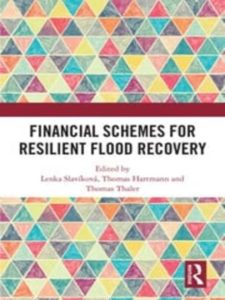How to design financial instruments in a flood recovery period and in the long run?
Financial schemes for flood recovery, if properly designed and implemented, might increase flood resilience. However, options for the increase of flood resilience during the recovery phase are to a large extent overlooked and the diversity of existing schemes shows that there has been a lack of consensus on how to achieve resilient flood recovery.
Financial Schemes for Resilient Flood Recovery investigates how the implementation of financial schemes (government relief subsidies, insurance schemes, buy-outs, etc.) might increase flood resilience. The chapters included in this edited volume address the following questions: Shall government relief subsidies exist when there is flood insurance in place, and, if so, how might they both be coordinated? Where (or how) to decide about build back better incentives and where to go for planned relocation programs? What is the distributional equity of financial schemes for flood recovery, and has it been sufficiently treated?
The book covers different approaches to flood recovery schemes with specific intervention rationales in different countries. Empirical evidence provided clearly shows the great diversity of financial flood recovery schemes. This diversity of state-funded schemes, private-based insurance schemes, and hybrids as well as planned relocation schemes indicates a lack of a consistent and strategic approach in flood risk management and flood resilience about flood recovery.
The chapters in this book were originally published in the Environmental Hazards.
Full citation: Slavíková L,, Hartmann, T., & Thaler, T. (2021). Financial Schemes for Resilient Flood Recovery (1st ed.). Routledge, Taylor & Francis Group.



